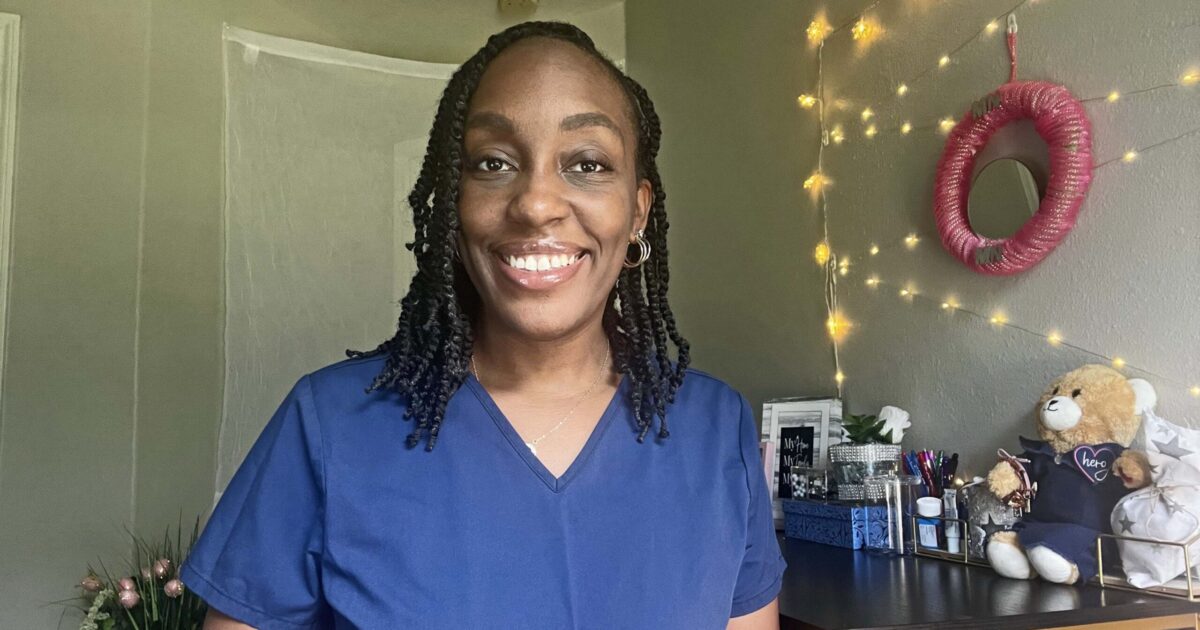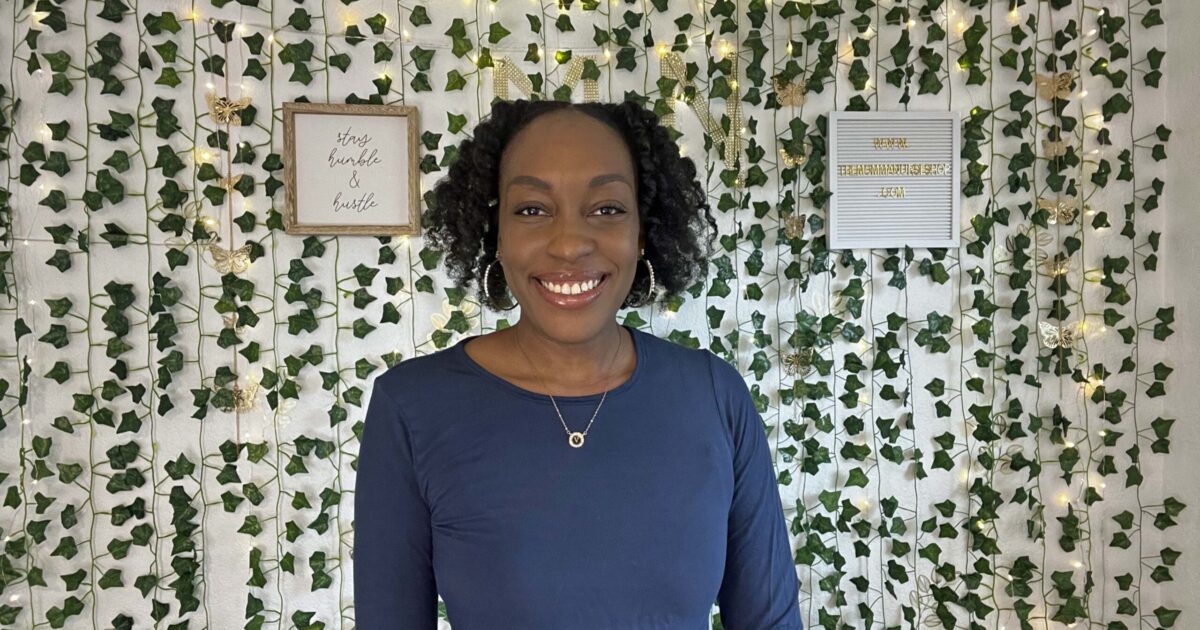In Vivian Health’s ongoing Rx for Success series, we profile a healthcare provider from our platform each week, highlighting critical career moments fueling their renewed passion for healthcare.
Picture a chaotic hospital ward during the height of COVID-19. Veteran trauma ICU nurse Venessa Thompson keeps seeing new nurses entering the field low on experience, filled with doubts and in need of guidance. She recognized an opportunity to step into a mentorship role, which reignited her passion for healthcare.
Thompson recounts one occasion vividly. A new young nurse was missing critical signs that his patient’s condition was about to turn south.
“I remember him just kind of tiptoeing through the day, just not as attentive as a trauma nurse should be,” Thompson told us.
She warned her new colleague to watch his patient’s monitors. The patient soon began crashing, and Thompson and her colleague scrambled with the medical team to stabilize him for surgery, which the patient thankfully survived.
Thompson recalls this young new nurse asking how she had foreseen the patient’s crash. She walked him through the warning signs.
“With experience, when you start seeing the heart rate go up and the blood pressure slowly coming down, you know that something’s about to occur,” she explained. “Either they need fluids, or they’re bleeding from somewhere.”
Thompson noticed a change in her colleague after that day.
“I remember a few weeks later, he came to me ahead of time and said, ‘These are the things that I’m seeing in a patient. What do you think this means?’” recalled Thompson. “He was picking up on those little cues. I knew that our prior conversation had really touched him and made him start thinking differently.”
A Passion for Trauma ICU Nurse Jobs

Mentoring her new colleagues through the COVID-19 crisis has had Thompson harkening back to her own early days in the field of trauma ICU. After her first four years in nursing as a med-surg nurse, Thompson said she started to feel too comfortable. She saw entering trauma as a way to challenge herself and specialize. Trauma ICU patients have typically sustained severe acute injuries, such as those seen in car or workplace accidents or from physical violence.
“I swear I’ll never forget that first day. I was standing right at the beginning of our fairly long unit of 36 beds. The double doors opened, and the first patient and the whole team came in,” Thompson recounted. “There was drainage everywhere. There were bandages everywhere. And I just remember watching the person go by and just looking and thinking in my head, oh my goodness, what did I sign up for? And I just said, ‘Okay, you’re here. You’re in scrubs, you have your badge on, let’s go!’”
Now after several years in the field, Thompson has noticed some changes in trauma nursing since the pandemic, such as staff-to-patient ratios increasing from 1-to-1 to 1-to-2 for some of the most severe cases.
“It becomes a safety risk because if one patient isn’t stable or things start changing rapidly, you could spend a good hour in that room with them, and then who is looking after your other patient?” she explained. “You have to really have a good team behind you to say, okay, I’m stuck here for a little bit. Can you please check on my other one?”
Despite the changes, Thompson says she doesn’t foresee herself working in any other nursing specialty.
“I’m never leaving trauma surgical, which is a blessing and a curse because it narrows down where I can go. Trauma isn’t everywhere, but I love it, so I’m willing to dig and find it wherever I can.”
Trauma ICU nurses work in designated trauma centers, often in larger regional hospitals with trauma surgeons and other specialists on call around the clock, so the position isn’t available at many locations. Waiting for a good travel trauma ICU job to open up is a key factor in Thompson’s decision-making calculus for finding each new travel position.

Her Family Comes First
When Vivian Health spoke to Thompson, she was between travel positions, working in a PRN nursing role, which comes from the Latin pro re nata, meaning “as needed.”
Thompson explained that “You have the autonomy to make your own schedule. You pick the shifts that work for you and if the hospital has a need that day, you work, but if they don’t really need you, then they may cancel you. The hours are not guaranteed.”
Thompson, a mother of four, is fine with the PRN role for now as she searches for the next trauma ICU travel position in a location that’s good for raising her family.
“We don’t automatically just take any assignment,” she clarified. “It’s a lot of research. We want a safe environment. We look at crime rates. We try to find areas that seem to have a lot of family-friendly activities, museums, parks and things like that. And we pray that, knock wood, the place is really what was presented to us online.”
As a mother, Thompson takes the stress of working a trauma ward in stride but feels it more acutely when the patient is a minor.
“I don’t work with pediatrics, but in trauma, if they’re 16 years old or over, we could take care of them. Those ones are hard. Even though my children are young, it still hits home, and I’m like, ‘This is somebody’s kid and it could be my kid, God forbid.’ So that kind of puts a stress on it.”
Working in trauma has also given Thompson a critical eye for witnessing risky behaviors in the real world.
“Simply driving down the road, you see people, and you’re like, ‘Oh goodness, you’re going to be a trauma one day!’ They have their foot up on the dashboard or something like that, and you start to look at the world differently because you see that there’s a lot out there, and your life can change in the blink of an eye.”
Thompson Counts on the Vivian App
When searching for the ideal travel position that satisfies both her love for the trauma ward and her desire for family-friendly locations, Thompson turns to the Vivian app.
“I love that within the Vivian app, they have trauma surgical positions that pop up and they show you the pay rate and required qualifications ahead of time. I also love that you can message the recruiters on the app directly so that you can get more information if you still have a question. That’s one of the things that I love about it.”
Explore the Vivian Health app to find your ideal trauma ICU nurse job or other staff or travel healthcare positions.










Love your enthusiasm and passion you have for what you do.
Well written. Venessa Thompson is a super hero.
Thank you for capturing my journey in Healthcare.
Thank you for sharing your journey with us, Venessa!